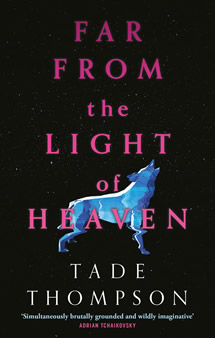Reviewed by Robert Goodman.
By Tade Thompson, Hachette, $22.99.
 Tade Thompson burst onto the science fiction scene with his eye-opening Wormwood trilogy (Rosewater, The Rosewater Insurrection and The Rosewater Redemption). Those books, which involved slow and weird alien invasion, demonstrated a deft capacity to juggle high concept, character development and page-turning action. Thompson latest book Far from the Light of Heaven feels, when it opens, to be a little more down the line. But not long into the narrative readers will find the same unique perspective and story telling style that made the Wormwood books so engaging.
Tade Thompson burst onto the science fiction scene with his eye-opening Wormwood trilogy (Rosewater, The Rosewater Insurrection and The Rosewater Redemption). Those books, which involved slow and weird alien invasion, demonstrated a deft capacity to juggle high concept, character development and page-turning action. Thompson latest book Far from the Light of Heaven feels, when it opens, to be a little more down the line. But not long into the narrative readers will find the same unique perspective and story telling style that made the Wormwood books so engaging.
Michelle ‘Shell’ Campion is preparing to be first mate aboard the colony ship Ragtime, with 1000 colonists heading to the planet Bloodroot. Everything she does is backup as the whole voyage will be run by a sophisticated artificial intelligence. Only when she is awoken on arrival at Bloodroot she finds the artificial intelligence has been placed in “backup mode” and thirty-one of her cryogenically preserved passengers are dead and dismembered. The Bloodroot authorities send Rasheed Fin, an investigator, and his robot assistant Salvo, to investigate before allowing the colonists to be revived and settled. They find Shell barely holding things together as the danger mounts, including facing a swarm murderous maintenance robots. The three are soon joined by Lawrence Biz, governor of Lagos, the nearest space station, and friend of Shell’s father, and his part alien daughter Joké. And then the situation really deteriorates.
Far from the Light of Heaven is for most of its length a locked room mystery. Shell and her companions are trying to solve the mystery of the dead crew and rogue AI while also trying to stay alive. This aspect of the book is full of the weird happenings, organic horror and character beats that characterise much of Thompson’s work. A lengthy exposition unravels the mystery but then sets up the even more action-oriented final quarter of the book. Around this plot is the wider political situation being played out on Bloodroot and the waystation Lagos, and the broader mystery of the alien Lambers.
Despite all of the dirty corporate dealings revealed, Thompson’s interstellar future, at least when the book opens, is fairly utopian. As Lawrence observes at one point:
So far, war has been restricted to the home planet, Earth. No wars in the Brink, and all the systems would like to keep it that way. No huffing and puffing, no brinksmanship, no posturing; remarkable for Homo sapiens, really.
While it does not quite get to that point in this book, Thompson explores the impact of those Earth-based conflicts being exported to those other systems. So that while this feels like a standalone novel, plenty of room is left to explore the repercussions of the events of this book.
Tade Thompson’s Wormwood trilogy was a calling card for unique, African-inspired science fiction. In Far from the Light of Heaven Thompson takes some of his own tropes and ideas and projects them into a different milieu, one no less well imagined and researched. He debates in an Afterword as to whether this is space opera, and concludes that “current wisdom is that the book isn’t space opera”. Which is probably true, but the distinction will only be important for those looking for labels, otherwise the question is irrelevant. What is relevant is that this is another unique, mind-expanding, piece of science fiction and that should be enough for any fan of the genre.
This and over 700 other reviews can be found on Pile By the Bed.



